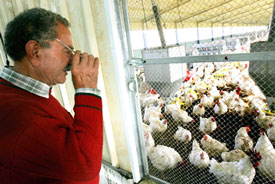/GIN
- US ‘dumping unsold GM food on Africa’ (UK Guardian, 10-07-2002)
- How Western Rubbish is Destroying Africa (Independent, 09-21-2006)

BRUSSELS (IPS/GIN) – Europeans love chicken breast. What do they do with the chicken legs? The current answer: Freeze them and ship them to Africa where they sell at a price far cheaper than fresh local chicken.
Television journalist Marcello Faraggi has put this chicken-and-Africa story in a documentary shown at the European Parliament in Brussels last week. Green Member of European Parliament, Carl Schlyter, who wants to support him in drawing attention to this dubious export, invited him.
Mr. Faraggi took Cameroon as a case study, but said much the same is going on with other African countries.
The export makes European and Brazilian producers happy because they make their profits on the breast anyway, and even with the shipping cost, export to Africa is more profitable than destroying chicken legs back home, the documentary shows. African producers are less happy.
In Cameroon, imported chicken parts are selling at 900 XAF (Communaute Financiere Africaine franc, or 1.37 euro per kilo), while whole local chicken costs 1,300 XAF (1.98 euro) a kilo, Jean-Jacques Grodent from SOS Faim told IPS. SOS Faim is a Belgian-Luxembourg NGO that supports farmers’ movements and microfinance organizations in the south.
The NGO has been campaigning on this issue for some time. It collected 62,481 signatures in 2005 for a petition against such dumping, and handed the petition to the European Commission, the executive arm of the European Union (EU).
“The competition from cheap, imported chicken from Europe made 92 percent of small chicken farmers in Cameroon lose their main income source between 1996 and 2003,” Bernard Njonga of the Cameroon NGO, the Association Citoyenne de Défense des Intérêts Collecitifs (ACDIC), told IPS. ACDIC leads a campaign against the chicken imports and now has more than 10,000 members–farmers and also consumers.
“That meant 645 farms going under. Typically four to six families depend on each farm. These people lost their jobs and were dumped into poverty,” Mr. Njonga said. He was in Brussels to attend the screening of the documentary.
Import of European frozen chicken peaked in Cameroon in 2003 when it imported 24,420 tons of frozen chicken, according to customs figures. The bulk was shipped from Spain (10,780 tons) and Belgium (10,540 tons).
The chicken import in Cameroon rose suddenly from 1995 onwards, not because people suddenly began to crave European frozen chicken legs, but because the Marrakech agreement came into force Jan. 1 that year, Mr. Grodent said.
The Marrakesh Agreement, signed in Marrakech in Morocco Apr. 15, 1994, established the World Trade Organization. It includes also the Agreement on Agriculture, which has been criticized for reducing tariff protection for small farmers while allowing rich countries to continue to pay massive subsidies to their farmers.
Cameroon was not the only country affected. “The same dumping of frozen chicken happened in other countries with weak governments on the west coast of Africa,” Mr. Grodent said.
Many companies are involved. “It is hard to point a finger at specific companies, as chicken raising and selling involves a long chain of companies, ending with brokers who basically will sell and ship anything,” Mr. Faraggi told IPS.
Cameroon may become a dumping ground again. Central Africa is on the verge of signing an Economic Partnership Agreement (EPA) with the EU that is due to enter into force in January 2008. “If the EPA is signed the way it is now designed, Cameroon would no longer be allowed to have such a high tax on frozen chicken,” said Mr. Grodent.
The Cameroon Comité National Du Negocations EPA–the national committee that involves non-state actors in the negotiations–is campaigning again to stop that from happening. ADCIC has started networking with other organizations in Gabon, Tsjaad, Central African Republic and Congo-Brazzaville to stop such import.
“We want to help them from our own experience and stop it starting all over again in Cameroon.”
Back in Brussels, filmmaker Mr. Faraggi said he now has problems eating chicken breast. “These things have an impact on daily life, too. But the real solution is better economic rules. Free trade is OK, but not without rules.”












